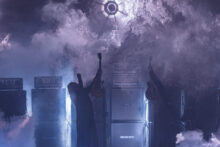Geologists read history in a language of scarred stone. But it can also be read in sound. Indeed, we can learn as much about a landscape from the sounds that populate it as from the sun bleached earth.
I remember first coming across Bolivian-American musician Chuquimamani-Condori around a decade ago with their album, American Drift, put out under the name Elysia Crampton (they now use their Aymara name). The record stood apart from much of the deconstructed club music so prevalent at the time. Whether sardonic or not, there was a touch of death drive accelerationism to that movement. Some of the music felt coldly lacking, with a boorish commitment to jabby jump scares rendered in the highest of high def. Call it diffuse club music, built on the traces of better times to be had, all the life of a tech expo.
This was never true for Chuquimamani-Condori. In their world, art and archivism are one and the same. We can hear the thumping sound of car speakers, DJ tags, a blur of tuning radios, these clusters of samples used as a kind of sonic archeology. We travel through landscape and airwaves. Their work is steeped in the history of queer and indigenous people, the ties to place and the drift of migration, with an approach to production fidelity that eschews colonial ideas of the future.
Now we find them teamed up proper with longtime collaborator and brother Joshua Chuquimia Crampton, an artist many ears were tipped to with last year’s breakthrough Estrella Por Estrella, a set of maximalist guitar workouts that riffed through space time.
Los Thuthanaka is their self-titled debut. Defiantly unmastered and deeply psychedelic. A trance record in the true sense, eternal time in the rhythms of cumbia, the steps of the Andean dance huayño. We’re left with a sense of slack jawed euphoria.
‘Q’iwanakax-Qiwsanakax Utjxiwa’ (or to use its English language translation, ‘The Queer-People Medicines Are Here’) is pure shambling bliss, all mirror shard guitar and synths that sigh like daybreak. ‘Jallalla Ayllu Pahaza Marka Qalaqutu Pakaxa’ is a muffled fireside rave, soaked up by inhabitants of the soil.
As the album progresses the tracks get longer and the grooves get heavier, Joshua’s guitar veering toward quasi metal crunch. It’s easy to view sound as impermanent, like a puff of smoke that dissipates in the air. Hard to grasp and hard to trace. Better to view Los Thuthanaka as a kind of literal rock music.
They’re persistent. ‘Kullawada “Awilla”’is a near twelve minute march through a percussive minefield. Detonation becomes dance. We then get what must be the busiest piece of drone music you’ll hear all year in ‘Parrandita “Sariri Tunupa”’, noise as devotional revelry.
With Los Thuthanaka, reference is futile. I’m reminded, in terms of sensory impact, of tunes like Ashtray Navigations’ ‘Comic Lever’ or Rehman Memmedli’s ‘Xal Qalmadı’. But really, you could cite everything and nothing here. Theirs is a borderless psychedelia, both pre and beyond colonial lines.



